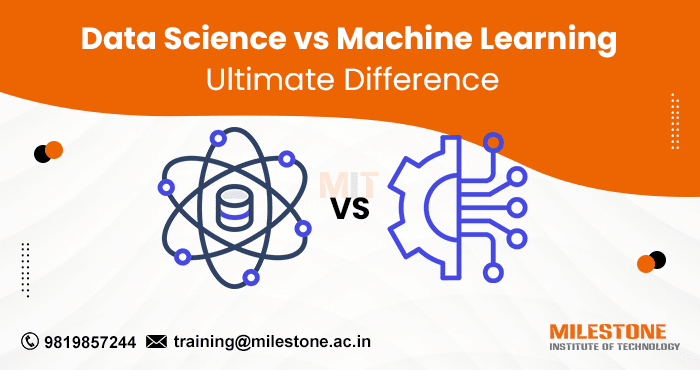In this developing modern digital world, data science and machine learning have become essential concepts in this crucial field of analytics and decision-making. They stand for different fields with their own set of abilities, professional pathways, and working methods. In this complete blog of
Data Science vs Machine Learning we will understand the definition, skill, roles, opportunities and many more. Let’s dive into more detailed differentiation between data science and machine learning.
What is Data Science?
Data Science is basically an interdisciplinary field which utilizes scientific methods, processes, and systems to extract essential insights as well as knowledge from unstructured datasets. It includes a wide range of techniques, which includes data mining, statistics, machine learning and visualization, for deriving actionable insights and complex data. From data collection and preparation to analysis and interpretation, data science encompasses the full data lifecycle.
What is Machine Learning?
Machine learning is a subset of artificial intelligence (AI). It focuses on creating algorithms and models which enable us to learn from data and make better decisions and predictions. In order to identify patterns and make predictions on various old unseen data, it entails training algorithms on labeled data. Reinforcement learning, semi-supervised learning, unsupervised learning, and supervised learning are the four divisions of machine learning algorithms, contingent upon the large volume of data and learning approach utilized.
Data Science vs Machine Learning: A Comparison
| Aspect |
Data Science |
Machine Learning |
| Scope |
Broad, encompassing various techniques and methodologies for data analysis and interpretation. |
Specifically, focusing on developing algorithms that learn from data and make predictions or decisions. |
| Objective |
Extract insights, patterns, and trends from data to inform decision-making processes.> |
Develop predictive models or systems that can learn and improve from data without explicit programming. |
| Techniques |
Includes machine learning, statistics, data mining, data visualization, and many more. |
Primarily involves building and training algorithms using supervised, unsupervised, or reinforcement learning techniques. |
| Application Areas |
Marketing analytics, healthcare informatics, finance, social media analysis, etc. |
Natural language processing, computer vision, recommendation systems, autonomous vehicles, etc. |
Skills Comparison: Data Science vs Machine Learning
Data Science Skills:
- Develop your skills and expertise in programming languages like Python, R, or SQL.
- Build a strong understanding of probability theory and statistics.
- Preprocessing and Data Wrangling skills.
- Increase the knowledge of machine learning algorithms and techniques.
- Gain skills and expertise with data visualization tools which includes tableau Matplotlib, or Seaborn.
- Empower your domain expertise in field of application or specific industries
Machine Learning Skills:
- Develop your expertise in programming languages such as Python, Java, or C++.
- Gain complete in-depth understanding of techniques and machine learning
- Increase your skills to analyze large datasets and preprocess efficiently.
- Build your proficiency in frameworks as well as libraries like TensorFlow, PyTorch, or scikit-learn.
- Experience with deep learning architectures for complex tasks like image recognition or natural language processing.
- Strong mathematical background, including linear algebra and calculus.
Roles Comparison: Data Science vs Machine Learning
There are different roles for both data science as well as machine learning, Lets understand what are the basic roles of both data science and machine learning:
Data Science Roles:
- Data Cleaning and Preprocessing: Data scientists are responsible for cleaning and preprocessing raw data to make it suitable for analysis. Managing missing values, outliers, and inconsistent formatting are all part of this.
- Exploratory Data Analysis (EDA): They perform exploratory data analysis to uncover patterns, trends, and relationships within the data using statistical methods and visualization tools.
- Machine Learning Model Development: While not the primary focus, data scientists also build machine learning models to predict outcomes or classify data based on patterns identified during the EDA phase.
- Communication and Storytelling: Data scientists communicate their findings to stakeholders through reports, presentations, or interactive dashboards, translating technical insights into actionable business recommendations.
Machine Learning Roles:
- Model Training and Evaluation: Regression, classification, clustering, and deep learning are some of the techniques that machine learning engineers use to train, optimize, and assess machine learning models.
- Feature Engineering: To enhance the functionality of machine learning models, they extract relevant features from raw data and engineer them.
- Deployment and Optimization: In order to maximize scalability, efficiency, and performance, machine learning engineers implement demonstrated models into real-world settings.
- Algorithm Selection and Tuning: Based on the nature of the problem, they choose the best algorithms and adjust hyperparameters to get the best possible model performance.
Career Opportunities in Data Science
There is numerous career opportunity in data science field which includes:
- Data Scientist: Analyzing complex datasets to uncover insights and drive business decisions.
- Data Analyst: Transforming data into actionable insights for business improvement.
- Business Intelligence Analyst: Developing dashboards and reports to visualize data trends and performance metrics.
- Data Engineer: Building and maintaining data pipelines and infrastructure for efficient data processing.
- Statistician: Applying statistical methods to analyze and interpret data for research or business purposes.
- Data Consultant: Providing expertise and guidance on data-related projects and strategies.
Career Opportunities in Machine Learning
Machine Learning offers exciting career prospects in cutting-edge technologies and industries, including:
- Machine Learning Engineer: Developing and deploying machine learning models for various applications.
- AI Research Scientist: Conducting research for advancing the field of machine learning (ML) and artificial intelligence (AI).
- Robotics Engineer: Designing and programming robots with machine learning capabilities for automation and autonomy.
- Computer Vision Engineer: Developing algorithms for image and video analysis, object detection, and recognition.
- Natural Language Processing Engineer: Creating algorithms and models for understanding and processing human language.
- Data Scientist (with specialization in Machine Learning): Leveraging machine learning techniques to analyze data and derive insights for business or research purposes.
Which is the best Institute to learn Data Science and Machine Learning?
When it comes to learning both
Data Science as well as Machine Learning, choose the best place for boosting your skills as well as expertise. We will recommend Milestone Institute of Technology, which is known for expert training from experienced faculties, practical training (live projects), career guidance, and many more. Many of you might be thinking of learning from online platforms, but we will suggest you to learn every course in offline mode for better understanding and career development.
Frequently Asked Questions
Is Data Science the same as Machine Learning?
While Data Science encompasses various techniques for data analysis, Machine Learning focuses specifically on developing algorithms that learn from data and make predictions or decisions.
What are some common applications of Data Science and Machine Learning?
Data Science is applied in marketing analytics, healthcare informatics, finance, and social media analysis, while Machine Learning is used in natural language processing, computer vision, recommendation systems, and autonomous vehicles.
What career paths are available in Data Science and Machine Learning?
Data Science offers roles such as Data Scientist, Data Analyst, and Data Engineer, while Machine Learning includes positions like Machine Learning Engineer, AI Research Scientist, and Computer Vision Engineer.




